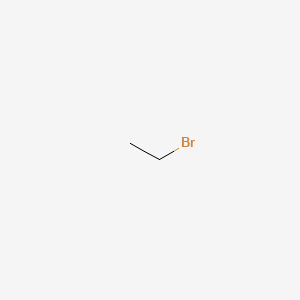


1. 74-96-4
2. Ethyl Bromide
3. Ethane, Bromo-
4. 1-bromoethane
5. Monobromoethane
6. Bromic Ether
7. Hydrobromic Ether
8. Bromure D'ethyle
9. Ethylbromide
10. Bromo-ethane
11. Etylu Bromek
12. Halon 2001
13. Nci-c55481
14. C2h5br
15. Nsc 8824
16. Bromoethane (ethyl Bromide)
17. Li8384t9ph
18. Nsc-8824
19. Etylu Bromek [polish]
20. Ccris 2504
21. Hsdb 532
22. Einecs 200-825-8
23. Un1891
24. Nci-554813
25. Unii-li8384t9ph
26. Bromodiborane
27. Ethylbromidium
28. Bromo Ethane
29. Ai3-04462
30. 1-bromethane
31. 2-ethyl Bromide
32. 1-bromo Ethane
33. Et-br
34. Ch3ch2br
35. 1-bromo-ethane
36. Dsstox_cid_199
37. Bromoethane [iarc]
38. Ec 200-825-8
39. Ethyl Bromide [mi]
40. Schembl2322
41. Dsstox_rid_75428
42. Dsstox_gsid_20199
43. Ethyl Bromide [hsdb]
44. Wln: E2
45. Chembl156378
46. Schembl2319234
47. Dtxsid6020199
48. Chebi:47232
49. Nsc8824
50. Bromoethane, Reagent Grade, 98%
51. Cs-d1408
52. Tox21_200355
53. Mfcd00000232
54. Stl197475
55. Akos000118754
56. Ethyl Bromide [un1891] [poison]
57. Bromoethane, Reagentplus(r), >=99%
58. Un 1891
59. Cas-74-96-4
60. Ncgc00091117-01
61. Ncgc00091117-02
62. Ncgc00257909-01
63. Bbx
64. Bs-43810
65. B0588
66. Ft-0623246
67. C19354
68. Q412245
69. F0001-1861
| Molecular Weight | 108.97 g/mol |
|---|---|
| Molecular Formula | C2H5Br |
| XLogP3 | 1.4 |
| Hydrogen Bond Donor Count | 0 |
| Hydrogen Bond Acceptor Count | 0 |
| Rotatable Bond Count | 0 |
| Exact Mass | 107.95746 g/mol |
| Monoisotopic Mass | 107.95746 g/mol |
| Topological Polar Surface Area | 0 Ų |
| Heavy Atom Count | 3 |
| Formal Charge | 0 |
| Complexity | 2.8 |
| Isotope Atom Count | 0 |
| Defined Atom Stereocenter Count | 0 |
| Undefined Atom Stereocenter Count | 0 |
| Defined Bond Stereocenter Count | 0 |
| Undefined Bond Stereocenter Count | 0 |
| Covalently Bonded Unit Count | 1 |
Absorption and excretion through the lungs is rapid ... .
Bingham, E.; Cohrssen, B.; Powell, C.H.; Patty's Toxicology Volumes 1-9 5th ed. John Wiley & Sons. New York, N.Y. (2001)., p. V5: 173
Ethyl bromide has been shown to be absorbed through intact rabbit skin. Ethyl bromide was detected in the rabbits' exhaled air after 20 minutes of skin contact.
American Conference of Governmental Industrial Hygienists. Documentation of the TLVs and BEIs with Other World Wide Occupational Exposure Values. 7th Ed. CD-ROM Cincinnati, OH 45240-1634 2013., p. 3
Ethyl bromide administered intraperitoneally to rats and mice was found to be rapidly detoxified and did not accumulate upon repeated administration.
American Conference of Governmental Industrial Hygienists. Documentation of the TLVs and BEIs with Other World Wide Occupational Exposure Values. 7th Ed. CD-ROM Cincinnati, OH 45240-1634 2013., p. 4
Unchanged bromoethane account for approximately 70% of the dose in the expired air of rats dosed orally by gavage.
IARC. Monographs on the Evaluation of the Carcinogenic Risk of Chemicals to Humans. Geneva: World Health Organization, International Agency for Research on Cancer, 1972-PRESENT. (Multivolume work). Available at: https://monographs.iarc.fr/ENG/Classification/index.php, p. V71 1306 (1999)
... It may be hydrolyzed to a significant degree in body, resulting in formation of inorganic bromides.
Bingham, E.; Cohrssen, B.; Powell, C.H.; Patty's Toxicology Volumes 1-9 5th ed. John Wiley & Sons. New York, N.Y. (2001)., p. V5: 173
Ethylmercapturic acid is also an ethyl bromide metabolite as shown by its appearance in the urine of rats administered 1.25 g/kg subcutaneous doses of ethyl bromide. This finding was supported by the presence of S-ethyl-cysteine in acid-treated urine.
Bingham, E.; Cohrssen, B.; Powell, C.H.; Patty's Toxicology Volumes 1-9 5th ed. John Wiley & Sons. New York, N.Y. (2001)., p. V5: 172
Ethyl bromide is a substrate for glutathione S-transferase. Female Wistar rats given 1.16 millimoles of ethyl bromide in oil by gavage were sacrificed 2 hours later, and livers were assayed for glutathione; ethyl bromide-treated rats showed liver glutathione levels 52% that of controls.
Bingham, E.; Cohrssen, B.; Powell, C.H.; Patty's Toxicology Volumes 1-9 5th ed. John Wiley & Sons. New York, N.Y. (2001)., p. V5: 172
The substrate specificity of ammonia monooxygenase in whole cells of the nitrifying bacterium Nitrosomonas europaea have been determined for a number of aliphatic halogenated hydrocarbons. The effect of the halogen substituent and carbon chain length on substrate reactivity was studied by measuring the rates of oxidation of monohalogenated ethanes (fluoroethane, chloroethane, bromoethane, and iodoethane) by whole cells of Nitrosomonas europaea. For monohalogenated ethanes, acetaldehyde was the major organic product and little or none of any of the alternate predicted products (2-halogenated alcohols) were detected.
PMID:2394686 Full text: https://www.ncbi.nlm.nih.gov/pmc/articles/PMC213201 Rasche ME et al; J Bacteriol 172 (9): 5368-73 (1990)
For more Metabolism/Metabolites (Complete) data for Ethyl bromide (7 total), please visit the HSDB record page.
BUILDING BLOCK

MARKET PLACE

